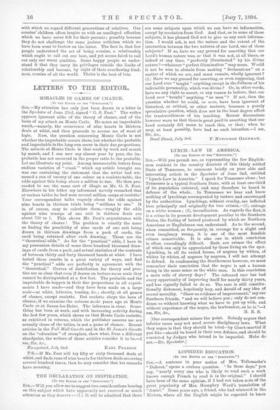LETTERS TO THE EDITOR.
MIRACLES IN GAMES OF CHANCE.
[TO THE EDITOR OF THE " SPECTATOR." I
SIR,—My attention has only just been drawn to a letter in the Spectator of June 23rd, signed " G. S. Foot." The writer appears ignorant alike of the theory of chance, and of the basis of my attack on Monte Carlo. He notes an improbable iwsult,—namely, the occurrence of nine hearts in thirteen deals at whist, and then proceeds to accuse me of want of logic. Now, the question concerning Monte Carlo is not whether the improbable occurs there, but whether the probable and improbable in the long-run occur in their due proportions. The miracle at Monte Carlo is that week by week and month by month, and I can now say almost year by year, the im- probable has not occurred in the proper ratio to the probable. Let me illustrate my point. Among innumerable letters from endless varieties of " crank " which my article brought me, was one containing the statement that the writer had wit- nessed a run of twenty of one colour on a roulette-table, the odds against this being about a million to one. He then pro- ceeded to use the same sort of illogic as Mr. G. S. Foot. Elsewhere in his letter my informant naively remarked that at various tables he had seen several million coups at roulette I Your correspondent talks vaguely about the odds against nine hearts in thirteen trials being " millions to one." It is, of course, easy to calculate them,—roughly the odds against nine trumps of one suit in thirteen deals are about 730 to 1. This shows Mr. Foot's acquaintance with the theory of chance The problem is exactly the same as finding the possibility of nine cards of one suit being drawn in thirteen drawings from a pack of cards, the card being returned after each drawing. These are the " theoretical odds." As for the "practical" odds, I have in my possession details of some three hundred thousand draw- ings of cards from a pack, and actual statistics of the contents of between thirty and forty thousand hands at whist. I have tested these results in a great variety of ways, and find the "practical" odds are perfectly in agreement with the " theoretical" Curves of distribution for theory and prac- tice are so close that even if drawn on lecture-room scale they cannot be distinguished at a few feet. The probable and the improbable do happen in their due proportions in all experi- ments I have made—and they have been made on a large scale—at whist, lotteries, tossing, &a. ; shortly, at all games of chance, except roulette. But roulette obeys the laws of chance, if we examine the returns made years ago at Monte Carlo or at Saxon-les-Bains. The inference is clear. Some- thing has been at work, and with increasing activity during the last few years, which shows us that Monte Carlo roulette, as exhibited in returns, which the publisher assures me are actually those of the tables, is not a game of chance. Recent articles in the Pall Mall Gazette and in the St. James's Gazette on the " education " of croupiers, show what, from a different standpoint, the writers of those articles consider it to be.—I am, Sir, &c., P.S.—If Mr. Foot will try fifty or sixty thousand deals at whist, and finds runs of nine hearts for thirteen deals occurring several hundred times, then he may consider that his remarks have meaning.










































 Previous page
Previous page